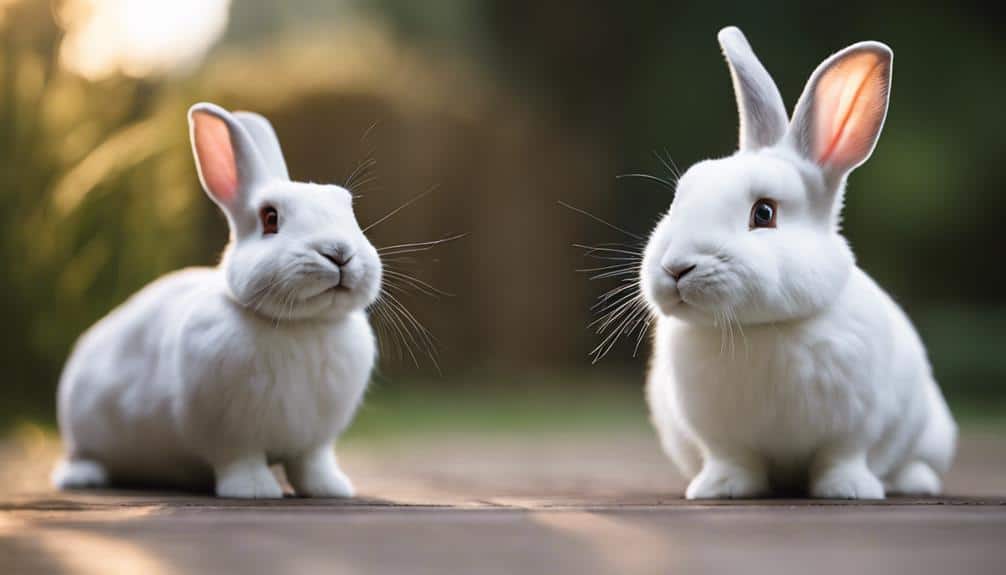When considering bringing a Rex or Dutch rabbit into your life, it's essential to understand the key differences between these two breeds.
First, let's talk about physical attributes. Rex rabbits have a unique, velvety fur that's extremely soft to the touch. They come in a variety of colors and have a more muscular build than Dutch rabbits. Dutch rabbits, on the other hand, have a more compact body with a distinctive white 'blaze' on their forehead and a white underside. Their fur is shorter and easier to maintain than that of Rex rabbits.
Personality-wise, Rex rabbits are known for being friendly, outgoing, and curious. They love human interaction and can become quite attached to their owners. Dutch rabbits, while still social, tend to be more independent and can be a bit more skittish around people.
By understanding these differences, you'll be able to decide which breed is better suited for your lifestyle and preferences.
Contents
Key Takeaways
So, you're wondering about the differences between Rex and Dutch rabbits? Let's dive in!
When it comes to size and build, Mini Rex rabbits are actually lighter but larger, with a slender build, whereas Dutch rabbits are more compact and rounded.
One of the most noticeable differences is their fur. Rex rabbits have this amazing velvety fur, whereas Dutch rabbits have a standard fur texture.
In terms of personality, Rex rabbits are generally calm, whereas Dutch rabbits are more energetic and need more attention from their owners.
When it comes to care, Rex rabbits require more exercise and grooming, whereas Dutch rabbits are relatively low-maintenance.
Finally, Rex rabbits tend to prefer quieter environments, whereas Dutch rabbits are happy to thrive in smaller spaces.
Size and Weight

When we compare the size and weight of Rex and Dutch rabbits, there's an important thing to keep in mind. Mini Rex rabbits usually weigh between 1.7 and 2 kilograms, which is a bit less than Dutch rabbits that weigh around 2 to 2.3 kilograms on average.
But even though Mini Rex rabbits are lighter, they can sometimes be a bit larger than Dutch rabbits because of their slender build and longer legs. Dutch rabbits have a more compact body, which makes them look shorter and more rounded compared to Mini Rex rabbits.
Mini Rex rabbits are considered small to medium-sized, while Dutch rabbits are known for being super compact. The difference in weight and size is a big deal when it comes to telling these two popular breeds apart. And if you're thinking of getting a rabbit, understanding these differences can help you choose the breed that's just right for you.
Fur Texture and Color
Rex rabbits have a special kind of fur that's super soft and velvety. This is because they've shorter guard hairs, which reveals the soft undercoat.
Dutch rabbits, on the other hand, have a more typical fur texture with distinct layers.
One of the main differences between Rex and Dutch rabbits is their fur type. Rex rabbits have a recessive fur type, which means they've that plush, velvety coat. Dutch rabbits, on the other hand, have a standard fur texture with both short undercoat hairs and longer guard hairs.
When it comes to colors and patterns, Rex rabbits really stand out. They come in a wide range of colors and patterns, including solid, pointed, and tortoiseshell varieties.
Dutch rabbits, on the other hand, are usually found in black and white color combinations.
It's also worth noting that Rex rabbits require more maintenance when it comes to their fur. They need regular grooming to prevent matting, whereas Dutch rabbits have shorter coats that are easier to take care of.
Temperament and Personality

Dutch rabbits have a unique temperament and personality that sets them apart from their Rex counterparts. While Rex rabbits are known for being calm and gentle, Dutch rabbits are more energetic and require more attention and playtime.
Both breeds are friendly and social, but they have some key differences. Rex rabbits are laid-back and easy-going, making them a great fit for families with kids or people who want a low-maintenance pet. Dutch rabbits, on the other hand, can be a bit more skittish and may need some extra patience.
Here's a quick comparison of their personalities:
| Rex Rabbits | Dutch Rabbits |
|---|---|
| Calm and gentle | Energetic |
| Affectionate | Social |
| Easy-going | Playful |
| Docile temperament | Skittish at times |
| Enjoy human interaction | More independent |
Grooming Needs
Rex rabbits need a bit more attention when it comes to grooming. Their velvety fur is amazing, but it gets tangled and matted easily, especially during shedding seasons.
To keep them looking their best, you'll need to brush them daily. And when they're shedding heavily, you might need to brush them twice a day.
Dutch rabbits have a short, low-maintenance coat. They're much easier to care for in this regard.
A quick weekly brush is all they need to stay looking good.
Coat Care Tips
Regular grooming is super important for maintaining the health and appearance of your rabbit's coat. It helps prevent matting and tangling, which can be painful for them.
So, how do you care for your Rex or Dutch rabbit's coat?
When it comes to brushing frequency, Rex rabbits need daily brushing during shedding seasons to prevent matting and hairballs. Their velvety coats require extra attention.
Dutch rabbits, on the other hand, can get away with a weekly brushing routine since their coats are shorter.
Investing in a good quality rabbit brush is crucial. You want a brush that's suitable for your rabbit's coat type to effectively remove loose fur and prevent tangles.
Don't skimp out on this – it makes a big difference.
Regularly inspect your rabbit's coat for any matted fur, especially if you have a Rex breed. Gently work through any knots you find to prevent discomfort.
It's also a great opportunity to bond with your rabbit. Use grooming sessions as a way to spend quality time with them and strengthen your relationship.
Finally, if you notice any skin issues or excessive shedding, don't hesitate to seek advice from a veterinarian.
They can help you address any underlying health concerns promptly.
Shedding Frequency
Taking care of your rabbit's coat is super important for their overall health and how they look. One big factor in their grooming needs is how often they shed.
Rex rabbits, for instance, have a special kind of coat with shorter guard hairs, so they don't shed much. You only need to brush them every now and then to keep their coat looking great. During the times of the year when they do shed, a quick brush once or twice a week will do the trick.
Dutch rabbits, on the other hand, have a thicker undercoat, so they shed more often, especially when the seasons change. They need regular brushing to prevent their fur from getting all matted up. If you have a Dutch rabbit, you might need to brush them every day to deal with their moderate shedding.
Overall, Rex rabbits need less grooming than Dutch rabbits because of their coat type, making them a great choice for people who don't have a lot of time to spend on grooming or who want a lower-maintenance pet.
When you're thinking about getting a rabbit, it's really important to understand how often they shed and how much grooming they need so you can take good care of them.
Activity Level and Playfulness

When it comes to activity levels and playfulness, Rex and Dutch rabbits are quite different. Their natural tendencies greatly impact how much engagement and stimulation they need.
Rex rabbits are high-energy, so they need plenty of exercise to prevent boredom and destructive behavior. Without enough physical and mental stimulation, they can get restless and cause trouble.
On the other hand, Dutch rabbits are more laid-back and don’t require as much stimulation. This makes them a great fit for busy owners who mightn’t have a lot of time to dedicate to playtime. Additionally, their gentle nature allows them to adapt well to various living environments, making them suitable companions even in smaller spaces. This relaxed demeanor is especially beneficial for families with children or first-time pet owners. Overall, Holland Lop ownership for beginners can be a rewarding experience, as these bunnies are not only affectionate but also relatively low-maintenance.
When it comes to play, Rex rabbits are curious and love to explore. They thrive with interactive toys and puzzle games that challenge them. Dutch rabbits, on the other hand, are happy just lounging around and mightn't be as interested in toys or high-energy activities.
While both breeds can be playful, Rex rabbits tend to demand more attention and activity than Dutch rabbits, who are content just hanging out with their owners. Understanding these differences is crucial when deciding which breed is the best fit for your lifestyle and ability to provide the necessary engagement for your pet.
Ideal Home Environment
Rex and Dutch rabbits have different needs when it comes to their ideal home environment. This is because of their unique characteristics and behaviors.
Rex rabbits are more energetic and playful, so they thrive in environments that offer plenty of space for exercise and exploration. They need larger living spaces with opportunities for vertical movement to accommodate their active nature.
Providing hiding places and tunnels can also help satisfy their need for mental stimulation. Plus, Rex rabbits prefer quiet surroundings to feel secure and reduce stress levels.
On the other hand, Dutch rabbits are more content with smaller living spaces and less activity. They enjoy peaceful environments that offer a sense of security and comfort.
Dutch rabbits are generally more laid-back and prefer a calm atmosphere with minimal noise and disruptions. While both breeds benefit from quiet surroundings, Rex rabbits may require a bit more space and opportunities for play to keep them happy and healthy.
To create a harmonious living environment, make sure your rabbit's living area caters to their specific needs.
Training and Interaction

When it comes to training and interacting with Rex and Dutch rabbits, it's really important to understand their unique needs.
Rex rabbits tend to respond well to positive reinforcement techniques. This means rewarding them with treats or praise when they do something you like.
On the other hand, Dutch rabbits might need a more patient and gentle approach. They can be a bit more sensitive, so you'll want to move at their pace.
Socialization is also key when it comes to these breeds.
It plays a huge role in how they behave around humans and other animals.
If you socialize them early and consistently, they'll be more likely to interact with you and others in a positive way.
Training Methods Comparison
When it comes to training Rex and Dutch rabbits, you'll find that different approaches work better for each breed. This is because they've unique temperaments and characteristics.
Rex rabbits are known for being good-natured and calm. They respond well to positive reinforcement training methods. They appreciate gentle handling and consistent routines, which makes them relatively easy to train compared to other breeds.
On the other hand, Dutch rabbits are energetic and playful. They benefit from training techniques that cater to their active disposition. Using interactive toys and activities in their training can help keep them engaged and mentally stimulated.
When it comes to socialization, both breeds enjoy human interaction. However, Rex rabbits may prefer quieter environments for training sessions, while Dutch rabbits thrive in more lively settings that allow for plenty of movement and play.
Building a strong bond with your Rex rabbit through regular training sessions can deepen your relationship and enhance trust, leading to a more harmonious companionship.
One thing to keep in mind, regardless of the breed, is that consistency in training methods and patience are key to effectively teaching your rabbit new behaviors and commands.
Socialization Differences
Dutch rabbits are super chill, social, and love affection. They enjoy human interaction and cuddling, making them a great fit for families with kids or first-time rabbit owners. They're also pretty easy to handle.
Rex rabbits are highly intelligent and curious. They need regular training and mental stimulation to prevent boredom and destructive behavior. They can be a bit more independent and aloof, so you'll need to put in more time and effort to build trust and a bond with them.
While Rex rabbits are highly trainable and thrive on structure and routine, responding well to positive reinforcement training, Dutch rabbits can be a bit more stubborn. They require patience and consistency in their training.
Both breeds benefit from early socialization and handling to develop good temperament and trust. However, Rex rabbits may need more intense socialization due to their high energy levels and curiosity.
Handling Preferences
Handling preferences for Rex and Dutch rabbits are shaped by their unique temperaments and socialization experiences. To create a positive experience for both rabbits and their owners, it's essential to understand the distinct characteristics of each breed when it comes to handling and interaction.
When handling Dutch rabbits, a gentle approach is crucial. They can be skittish, so you need to be patient and gentle to build trust. If you're not, they might nip or bite.
On the other hand, Rex rabbits are known for their calm and docile nature, making them easier to handle and train. This makes them a great choice for first-time rabbit owners.
Both Rex and Dutch rabbits benefit from regular handling and playtime. This helps build their confidence and makes them friendlier.
However, Dutch rabbits may require more time and effort in training because they tend to be more cautious and reactive.
Spending quality time with your rabbits is vital. You should aim to interact with both Rex and Dutch rabbits for at least 30 minutes a day to ensure their well-being and sociability.
Conclusion
So, you're trying to decide between getting a Rex rabbit or a Dutch rabbit. It's kind of like choosing between two different vacations. Do you want to relax in a peaceful garden or go on a fun adventure in a bustling city? Both breeds have their own unique qualities and characteristics that fit different lifestyles and preferences.
One of the main differences is their size. Rex rabbits are a bit bigger than Dutch rabbits. They also have different temperaments. Rex rabbits are known for being friendly and curious, while Dutch rabbits are more laid-back and easy-going.
When it comes to grooming, Rex rabbits need a bit more attention because of their thick, velvety fur. Dutch rabbits, on the other hand, have shorter coats that require less maintenance. Activity levels are also different between the two breeds. Rex rabbits need more exercise and stimulation to prevent boredom, while Dutch rabbits are happy with shorter play sessions.
By understanding these differences, you can find the perfect rabbit companion that fits your personality and living situation.






